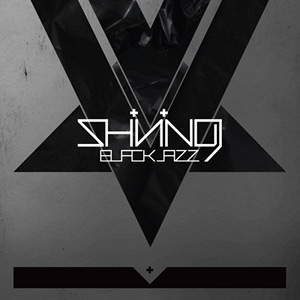It is a truth universally acknowledged in this here grubby skull that Shining’s 2007 release Grindstone was one of the finest of the decade — a dazzlingly intelligent chimera that took its cues from jazz, metal, prog, soundtrackery and neo-classical, but was never derivative or pompous or a dry exercise in style-spanning. Instead, it often had an irresistibly gleeful barrelling-down-a-hill-like-a-giddy-toddler vibe, similar in spirit to Cardiacs or Koenjihyakkei at full pelt.
Shining have always seemed like a work in progress (if being inexorably drawn towards full-blown maniacal evil can be considered ‘progress’). On their first two releases they were an unadulterated Ornettey jazz outfit. Number three, In the Kingdom of Kitsch You Will Be a Monster, brought the first taste of caustic guitars and an expanded worldview. Blackjazz makes it clear that the unchained genre-scooping of Grindstone was merely transitory, rather than the apotheosis it once seemed.
Easily the band’s heaviest, bleakest and most downright bloody nasty work, Blackjazz telegraphs its intentions right from the off, through its artwork, its name, its opening gambits. ‘The Madness and the Damage Done’ vomits itself into being with a distorted scream and a barrage of outrageously potent techno-fuzzed prog-metal riffs. Halfway through, the world caves in and we’re off on a micro-speed-prog adventure in ultra-minimalist repetition that brings to mind OV, Orthrelm’s exercise in Zen RSI, or fellow Norwegians Jazkammer’s Metal Music Machine.
First single ‘Fisheye’s danceable beats and knotty synths are relatively sober by comparison – at least until the spine-smash riffs, dastardly technical intricacy and hysterical numerical hollering make everything all beautifully sick and wrong again. ‘Healter Skelter’ is something of an oddity, reprising in its first half a sax line that has appeared on two other Shining albums, as ‘The Red Room’ and ‘REDRUM’. This band has a curious obsession with pointedly redundant repetition: ‘To be Proud of Crystal Colours is to Live Again’ appeared twice on Grindstone – and that album’s In the Kingdom of Kitsch… bore the name of the previous album. Further, two separate songs on Blackjazz are named ‘The Madness and the Damage Done’, and two are named ‘Exit Sun’. They clearly suffer no shortage of ideas – so perhaps this compensates for the lack of straight-up repetition in their tangled music. Or maybe they’re just trying to confuse, taking obvious delight in tiny touches of obfuscation.
Here we go. Track seven. ‘Blackjazz Deathtrance’. Even before you’ve heard a single note, you just know that this 11-minute track will be the core of this album. And so it is – an absurdly hyperkinetic metallic rave-cum-cyborg massacre that starts out like a debilitating panic attack and then kicks up several gears into full-blown metaphysical hysteria and bodily discorporation three minutes in. It’s extraordinary; the physically impossible music of a deliciously amoral post-human world as played by techno-organic life-forms imagined by Grant Morrison. For those of us unwittingly trapped in this century’s clunky brains and oozing bodies, it’s disturbingly forward-looking, guaranteed to make you feel like the dribbling shaved ape you really are.
We close with a brutalised take on King Crimson’s ’21st Century Schizoid Man’. Let’s be clear – the original is one of mankind’s greatest achievements, and this spectacular version reiterates that with obscene heaviness and vocals from Enslaved’s Grutle Kjellson (although it’s worth noting that even a band as technically adept as this one sidesteps the really tricky bit – as do the 130 other covers on YouTube. Kudos are due to Mr Fripp for sheer inimitability). However, as an expression of Blackjazz‘s obsessions, it’s a wee bit ‘page one of the jazzy prog-metal handbook’, a tad uncharacteristically obvious.
Blackjazz is an exhilarating, exhausting experience – the heaviest, most tumultuous moments of Grindstone were only mild foreshadowing of this dark future. For all the cathedral-bounding leaps they’ve made in terms of attack, physicality and intensity, Shining have ditched some of their playfulness and unpredictability. But they’ve also lost their sense of questing uncertainty, their slightly dilettantish air of experimentation. They now sound cohesive, focused, reborn in corruption, driven to disintegrate.


